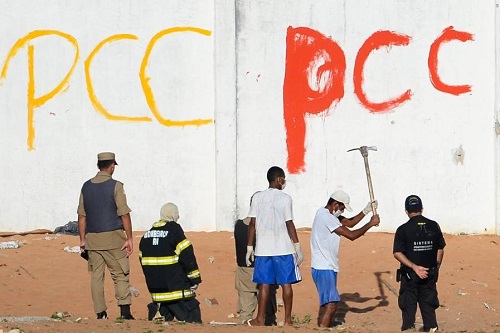Reuters photo
By
Ricardo Swire
The First Capital Command’s (PCC) secret documents, confiscated by Brazilian Federal Police during a recent probe of its leader’s death, revealed compelling internal configurations. In February 2018 two PCC top bosses “Paca” and “Gege do Mangue” were assassinated. The duo considered PCC’s highest ranking leaders were not incarcerated. The treasure trove of files was found inside the Birmingham penthouse apartment of crime character Nado, in the East zone of Sao Paulo. Nado plus “Waguininho” and “Cabelo Duro” were three contract killers assigned to the PCC top bosses’ elimination.
Files exposed PCC international drug traffickers’ identities. Data in law enforcement’s hands include names of PCC members in Sao Paulo, America, Bolivia, Colombia, Guyana, Paraguay and Peru. Three years ago Brazil’s Federal Police intelligence officials uncovered one criminal organization’s “Ghost Carrier” that transferred R$100 million via two brokerages. The technology channeled crime cash to China and the US, seven Internet Protocol (IP) addresses in Sao Paulo shuffling the select financial accounts across cyberspace.
One recent Brazilian internal security assessment highlighted PCC membership in Sao Paulo headquarters state alone mushroomed from six thousand in 2012 to eleven thousand at the beginning of 2018. On December 9, 2017 the PCC drug trafficking arm deposited Reais $1,464, 118 to a cambio in Sao Paulo. Two weeks later same members deposited R$1,522,374, 021 and R$1,105,651. Fourteen day cash deposits worth R$4 million. R$2500 was expended to purchase money bags. Federal Police Intelligence data noted significant growth in the gang’s strength. 2014’s three thousand PCC members total countrywide, catapulted to twenty thousand at the beginning of 2018.
PCC earns its place among Brazil’s five hundred largest companies. As the biggest national criminal organization it generates between R$400 million and R$800 million yearly. The PCC’s trafficking department exports one ton of cocaine weekly from the ports of Santos, Itajai, Rio and Fortress. Handwritten PCC documents described methods of drug money transfers via Bolivia and Paraguay. Two hundred gas-stations, purchased by lieutenants working for notorious crime boss “Aurora,” utilized as money laundering facilities. Transnational drug traffickers have evidently taken advantage of the PCC’s complex logistics.
The Nigerian mafia in Brazil promotes “container sharing” for transnational drug shipments. On Wednesday April 18, 2018 Brazilian Federal Police Counter-Narcotics detectives monitored a container truck registered S-10 in Guaruja city, Sao Paulo. An hour later law enforcers intercepted the transporter. A gun battle ensued and one Federal Police Officer was wounded, seven traffickers detained, three escaped. One semi-automatic assault rifle and one forty-five caliber pistol recovered. Two hundred and thirteen kilos of cocaine was seized.
Ricardo Swire
Ricardo Swire is the Principal Consultant at R-L-H Security Consultants & Business Support Services and writes on a number of important issues.



No Comments Yet!
You can be first to comment this post!